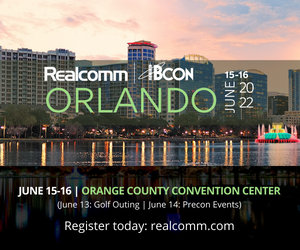The Great REconfiguration

Traditional real estate was built to facilitate the socio-economic demands of humans. In the agrarian age we built barns, in the industrial age we built factories and in the modern age we constructed automated factories consistent with Henry Ford's vision of mass production. Employees lived in neighborhoods, drove to work then to the mall to shop or the theater for a movie. The basic premise was that we required physical mobility in order to live a full life.
The technological age and the advent of the computer changed everything.  Mainframe computers that formerly required large rooms were reduced to desktop computers. The mobile computer era started in the 1980s with the development of the laptop computer and mobile phone. For the first time in history, information workers were untethered from their desks and could freely move around, accessing data through basic telecommunications systems.
Mainframe computers that formerly required large rooms were reduced to desktop computers. The mobile computer era started in the 1980s with the development of the laptop computer and mobile phone. For the first time in history, information workers were untethered from their desks and could freely move around, accessing data through basic telecommunications systems.
Fast forward to the introduction and expansive development of the Internet and mobile communications: today we work, shop, watch movies, video chat with doctors, listen to music, order food, make plane reservations as well as thousands of other tasks without having to move to a different physical space.
 The transformation from manual to digital moved at a reasonable pace, gradually eroding away old processes, norms, and customs, replacing space with advanced technology - until the pandemic. In 24 short months, the world was forced to accelerate and perform all these tasks from home. Executive leadership, who may have at one time questioned the potential impact of technology on life and how we use space, was now forced to actively participate in this grand remote experiment.
The transformation from manual to digital moved at a reasonable pace, gradually eroding away old processes, norms, and customs, replacing space with advanced technology - until the pandemic. In 24 short months, the world was forced to accelerate and perform all these tasks from home. Executive leadership, who may have at one time questioned the potential impact of technology on life and how we use space, was now forced to actively participate in this grand remote experiment.
As we emerge from this pivotal event in history, many are left wondering whether we will ever go back to the old (or even new) normal. Organizations are still struggling to determine who will be best served by the return to work. Today’s reality ranges from bringing everyone back in the office - which is being met by strong resistance - to a hybrid solution with many moving pieces and variables. The one fact most do agree on is that we still don’t know how we return to buildings at scale.
 This phenomenon is not only impacting office but also retail. Although the "Amazonization" of the retail supply chain was already underway, the pandemic brought on an explosion of home deliveries: packages on every porch that included screens for the home office, exercise bikes for the bedroom and a flood of grocery and restaurant food delivery. While traditional retail stores struggled due to restrictions and closures, the online world flourished.
This phenomenon is not only impacting office but also retail. Although the "Amazonization" of the retail supply chain was already underway, the pandemic brought on an explosion of home deliveries: packages on every porch that included screens for the home office, exercise bikes for the bedroom and a flood of grocery and restaurant food delivery. While traditional retail stores struggled due to restrictions and closures, the online world flourished.
So, with the pandemic fueling the fire of digital transformation, we find ourselves in an unfamiliar place. Habits which often spanned an entire career have been challenged and we are now re-entering a world that may no longer meet all of our needs. Long commutes, financial concerns, convenience and flexibility combined with broader issues like safety, climate and a changing work/life balance for some young adults all reveal that the return to space as we’ve known it is still to be determined.
Our theme for Realcomm | IBcon 2022 is REconfiguration. There will undoubtedly be habits, patterns and lifestyle changes that will never go back to what we might consider “normal.” This could bring about a permanent REconfiguration of migration patterns, city design and purpose, family dynamics, residential home design, transportation and organizational structure, entertainment, education, health services and so on.
This massive societal shift, as has been the case throughout history, will inevitably change how we use buildings. Buildings as gathering places were once the only option for personal interaction, but that paradigm was changed by technology – and now by the pandemic. As an industry, we need to be open to all of the options and opportunities of the Great REconfiguration. Offices morphing into apartments, retail stores into climbing gyms, malls into healthcare facilities, even the emergence of mobile offices inside airports; all the ideas developed over time are simply going to further accelerate in the years to come. In each and every case of REconfiguration, technology will play a critical role.
 Real estate must be ready for the 21st century and beyond as we integrate physical world experiences with the virtual - and it must be done quickly and seamlessly. Distributed mobile workforces, cloud-based business enterprise solutions, smart buildings, integrated immersive experiences and more will all require a well-defined blend of physical space and technology. For those who resist, the liability is real; for those who embrace, the possibilities are endless. Join us at Realcomm | IBcon 2022 as we explore the opportunities associated with buildings and the Great REconfiguration.
Real estate must be ready for the 21st century and beyond as we integrate physical world experiences with the virtual - and it must be done quickly and seamlessly. Distributed mobile workforces, cloud-based business enterprise solutions, smart buildings, integrated immersive experiences and more will all require a well-defined blend of physical space and technology. For those who resist, the liability is real; for those who embrace, the possibilities are endless. Join us at Realcomm | IBcon 2022 as we explore the opportunities associated with buildings and the Great REconfiguration.
Realcomm | IBcon 2022 will be held on June 15-16 (Golf Outing: June 13 | Precon Events: June 14) at the Orange County Convention Center in Orlando Florida. Register today! Early bird rate expiring March 22.
This Week’s Sponsor
Facilio's AI-driven property operations platform allows real estate owners to aggregate, optimize, and control building portfolio operations - all from one place. Customers across the world use Facilio to reduce operations costs, increase net asset value, and de-risk operational liability. Headquartered in New York City, Facilio is a global company backed by leading investors including Accel India, Tiger Global Management, Dragoneer Investment Group, and Brookfield Growth. More info at facilio.com.
Read Next
 5/15/2025
5/15/2025
Tech, Talent and Transformation: 2025 Digie Finalists Announced For 27 years, Realcomm has presented the Digie Awards to acknowledge companies, real estate projects, technologies, and individuals that have advanced the commercial real estate industry through the strategic use of technology, automation, and innovation.
 5/15/2025
5/15/2025
Empowering Space Management with Data-Driven Visualization For effective CRE space management, it’s critical to centralize lease data, maximize rental square footage (RSF), improve energy efficiency and reconfigure spaces to meet changing needs.
 5/8/2025
5/8/2025
The AI-Powered Workplace Evolution: Redefining the Business Landscape In today's rapidly evolving business environment, the fusion of Artificial Intelligence (AI) and Workplace Management is revolutionizing the way organizations approach workspace optimization and operational efficiency.
 3/27/2025
3/27/2025
The Convergence of Edge Computing, Cloud, and AI in Building Automation and Smart Buildings In the built environment, we have seen the convergence of Operational Technology (OT) and Information Technology (IT), later expanding to include Workplace Technologies (WP).






%20(1)%20(1)%20(1).png)







